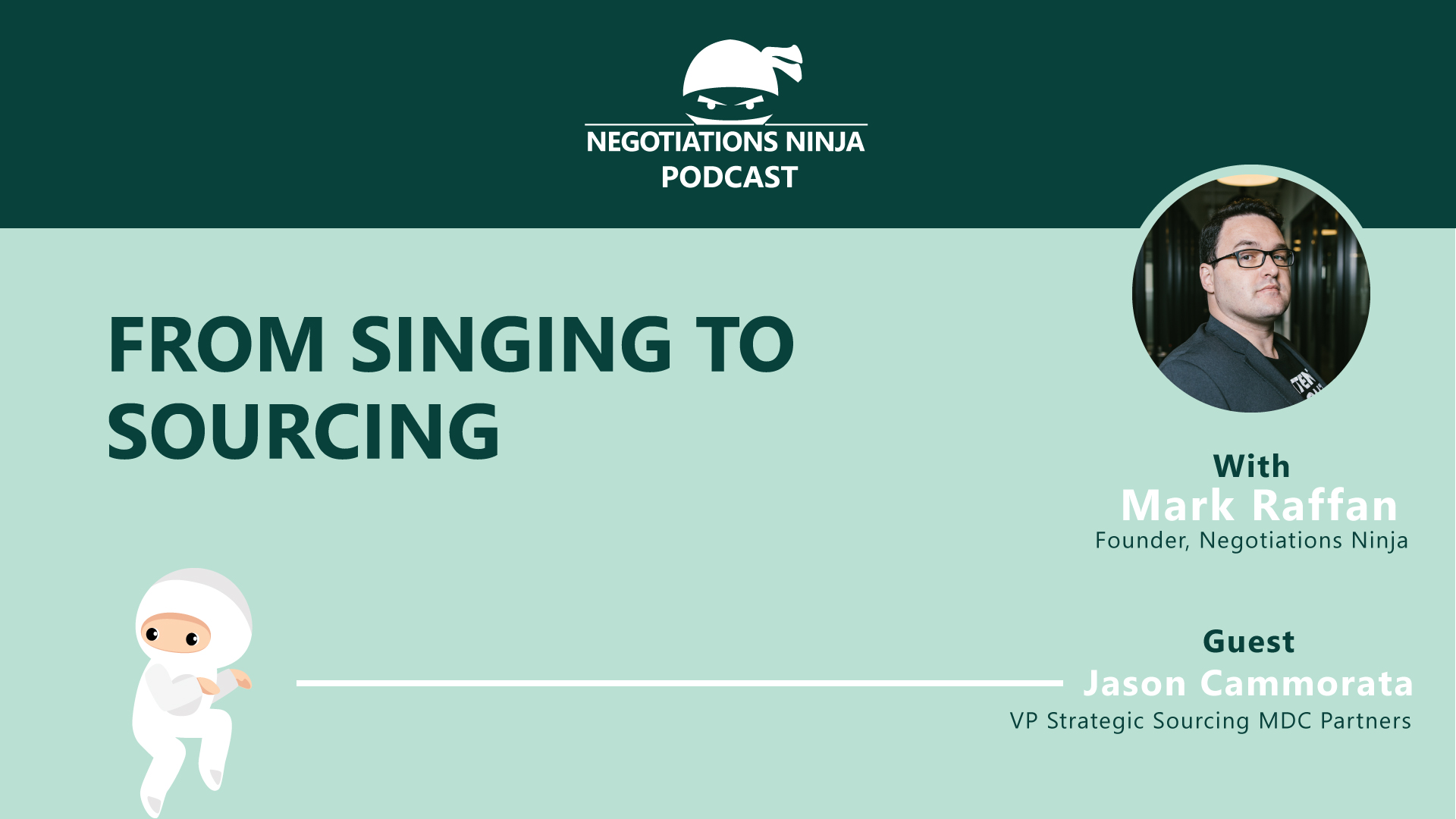SUMMARY
Jason Cammorata joins us to chat about the benefits unique and different backgrounds can have for procurement professionals. As a long-time, high-performing musician, Jason learned a lot about performance, planning, and preparation that he applied to his procurement and negotiation career. What lessons can we learn from our past experiences? How can we take the skills we’ve learned and leverage them today? This week we’re reflecting on our past to understand how to be more successful today.
Jason shares the key skills and traits he developed during his time as a vocalist and performer including the importance of being frugal, the need to be resourceful, why being prepared is so important and having the confidence to walk into any situation with a clear understanding of what you’re doing. He shares some great insights on knowing when you’re being too aggressive, reading body language, and why performing is the ultimate collaboration. This week’s episode is a great time to reflect on what you’ve done in the past (sports, music, performance and more) and think about how you can apply your knowledge from those areas into your negotiation practice.
Outline of This Episode
- [3:48] Jason’s background in procurement
- [5:11] A natural orientation towards value
- [6:54] Jason’s performance career
- [7:52] The transition from music to procurement
- [13:33] Know what you’re negotiating for
- [15:30] How do you know when to stop?
- [20:48] Collaboration in procurement
- [24:36] Use intuition with your counterpart
- [25:54] How to be in tune with stakeholders needs
- [29:04] Be brave and take calculated risks
- [29:52] How to connect with Jason
Lessons learned from the challenges Jason faced while performing
Jason points out that performing is something you have to do confidently. Confidence is everything in what he did then and does now. You must have a clear idea of what you’re walking into, in every situation. Jason notes that people often expect him to love karaoke because of his background. However, he hates singing karaoke because he likes to be in control.
When you’re singing karaoke you’re often at a bar, you don’t get a soundcheck, you don’t know what you’re singing or what the stage is like, and you may not know the words to the song. When you’re a performer, you’re prepared for every situation. Some of the best performers spend their entire lives preparing.
Jason emphasizes that If you’re not prepared, you get nervous. When you feel nervous, you lack confidence and people can easily read that. Preparedness is the key to a successful performance and negotiation.
The fine art of negotiating
Jason points out that you need to ‘figure out the truth’ before you negotiate because then you confidently know what you’re negotiating for. You need to know exactly why you’re asking for something. I’m not just asking for something to be cheaper because you want a deal, but because you need it for a specific reason. It’s understanding the why and the mechanics behind it.
At what point do you pull back? Do you just plow the other company into the ground? You have to stop yourself from being overly aggressive and asking for too much. You have to do the right thing. Jason points out that at the end of the day we’re all humans trying to make a living. Remembering this empowers him to do more for the business later on. It’s about creating a partnership.
Reading body language cues
How do you know when to stop pushing for concessions? For Jason, he likes working with people and has developed a good sense of where the edges are. Jason notes that most of the problems we face in business are a spin on communication or miscommunication. There’s a reason someone is acting the way they are—but it’s often up to you to dig deeper and figure out the ‘why’.
You need to watch people’s body language and be aware of what’s going on. Is your counterpart getting nervous? Can you see that they’re hurt, upset, or frustrated? You have to be cognizant of their emotions, then take it a step further—ask them why they’re upset. Is there simply a misunderstanding?
Asking why they appear upset allows them to voice what’s going on and can often move the negotiation in a more positive direction. Procurement people need to learn to be more empathetic. When we start to label emotions and how someone else may feel and allow them to address it, it does a lot to bridge the gap between the two parties’ interests.
Collaboration in a performance correlates with negotiation
Collaboration is currently a popular topic in procurement. What Jason did on stage was the ultimate collaboration. Something as simple as a soundcheck—without collaboration—fails. He and his wife sing together and they know exactly what the other is doing in every moment. They sang in harmony. They didn’t outshine each other or push the other to the background.
In music, it isn’t about making the other person shine—it’s about making the end product the best it can be. It’s about moving your audience and causing them to feel something. In a negotiation, it’s about your goals and how the process affects the client. It isn’t just about getting the best deal. It’s about the collaborative effort.
Move in the direction of your audience intuitively. You know when things are going well and when they’re not and adjustment is absolutely necessary.
What have you done in your past? How can the knowledge you’ve learned from those areas be applied to your negotiation practice? If you haven’t used those lessons, think about how you can apply them to benefit your careers and the people you work with.
Resources & People Mentioned
Connect with Jason Cammorata
- MDC Partners
- Connect on LinkedIn
Connect With Mark
- Follow Negotiations Ninja on Twitter: @NegotiationPod
- Connect with Mark on LinkedIn
- Follow Negotiations Ninja on LinkedIn
- Connect on Instagram: @NegotiationPod




